Today, we focus on the healing of Israel’s souls.
We begin with the music video above by Udi Kagan. Udi is an actor and comedian. He’s been on a number of different TV shows, including Eretz Nehederet (Israel’s version of SNL) and Gav HaUma, a popular satire with Lior Schleien (we featured something about it here).
The music video below is not satirical. There is nothing funny about it. It highlights the very real struggles of PTSD experienced by too many of the country’s soldiers, including Udi himself.
The song, “Factory Man,” is actually a Hebrew version of a song that Kagan produced 20 years ago. The lyrics have been changed in places to reflect the current situation.
It’s gone more than a bit viral in Israel, so we thought to share it with you. The original video, to which we added subtitles, is on Youtube here.
The very week that this war started, on October 10, we shared an interview of Maayan Adam (a well known TV and radio personality in Israel) and Yarden Adam. They are siblings whose younger sister, Mapal Adam, was killed at the Nova music festival on October 7.
Mapal’s boyfriend, Roei Shalev survived. But his heartbreak was evident to all, including to his mother. She was not at the Nova site. Her son survived, but she could not bear to witness his heartbreak. Shortly after we posted that interview, Roei’s mother took her own life.
Stories like this appear far too regularly in the Israeli news. Recently, for the first time, the Personnel Directorate of the IDF announced that the army will recognize soldiers who died of “personal circumstances” such as suicides or non-combat related accidents as war casualties. According to an article in Haaretz, between October 7 and May 11, 10 soldiers died by suicide. Reports of suicide among Nova survivors and their families are widespread, though numbers are hard to come by.
In today’s post, a podcast which we’re making available in full to everyone, we meet a woman far from the headlines, who has taken a classically Israeli step: he turned her grief at the loss of her own brother from suicide, years ago, into a drive to create a new organization designed to help those contemplating suicide.
Gal Nissim-Emanuel is not backed by the government, or any large organization. Her drive is fueled by grief and grit, nothing more.
In that sense, Gal’s story is in many ways the story of what has long made Israel the remarkable society that it is.
MONDAY (today, 09/16): Repairing broken souls is going to be an Israeli priority for as far as the eye can see. Since the beginning of the war, we’ve seen Israelis of all walks of life take responsibility for turning personal tragedy into ways of helping others. Gal Nissim, in the wake of her brother’s death long before the war, did the same thing, building her own organization to combat the problem of suicide in Israeli life. We share her story and work in a podcast available to everyone.
TUESDAY (09/17): “When the Heart Cries,” a now classic Israeli song by Sarit Hadad, has taken on new meaning in post-October 7 Israel. We share the song, a new duet of the song, and a video of former hostage Moran Stella Yanai speaking to Sarit Hadad about hearing her song in captivity
WEDNESDAY (09/18): With our hearts heavy and cracked, what should we feel, how should we think when the holidays arrive in just a few weeks. Rabbi Joe Wolfson leads a vibrant, inspiring Orthodox community of largely Anglos in Tel Aviv. In this week’s podcast, we find out from him about the burgeoning English-speaking college scene in Tel Aviv, his unique community’s engagement with secular kibbutzim and a Bedouin family, and his thoughts about how we can shape our hearts and minds in advance of holidays that are going to be challenging.
THURSDAY (09/19): Much has been written about the crisis in which progressive American rabbis find themselves, having been largely abandoned by the progressive partners they once thought they had. I discussed this (and more) with Rabbi David Ingber of Romemu in New York city early in the war, at the 92nd Street Y. The “Y” just made our conversation available on YouTube, so we’re reposting it here with some thoughts about how our collective thinking might have changed in the months that have ensued.
Gal Nissim-Emanuel is the founder of MOSHE – Words that Make a Difference, established in 2017 after Gal lost her brother, Moshik (Moshe Uri Nissim), to suicide. Gal has dedicated herself to prevent future suicides and to prevent the immeasurable pain that affects so many.
MOSHE is the only non-profit in Israel dedicated to suicide mitigation. MOSHE’s effective community-based approach is recognized by leading experts in the field.
For those in the United States who might wish to support MOSHE’s work can do so here.
Use this audio player to listen to the episode:
The link audio player link immediately above will access the full recording of our conversation; below you will find a transcript for those who prefer to read. Usually, these transcripts are made available specially for paid subscribers to Israel from the Inside. Today’s transcript is being made available to everyone.
Israeli society is obviously a society in deep trauma these days. There are hundreds of thousands of people who had to leave their homes, 100,000 or so who are still out of their homes. There are very many young widows. There are many young orphans. There are survivors of the Nova Festival who were hurt physically and are still recovering. There are survivors of the Nova Festival who are not hurt and who are dealing with tremendous sense of guilt about having brought friends there and so forth. Everywhere we turn, there is trauma, there is sadness, there's a struggle to hold on to hope. None of that is new.
What is new is, though, an organization that we're going to get to know today through the woman who founded it, Gal Nissim Emanuel, who founded the organization called Moshe. Now, Moshe, as you'll hear in our interview, was the name of her brother who tragically took his life through suicide in 2015. And in 2017, she founded the beginnings of this organization. In 2019, it became actually an official registered organization, not a group of therapists, but an organization with a take on the world about how to help families and small communities enable people who are struggling with deep depression and deep sadness to get out of what Gal, you'll hear, calls the dark tunnel that can lead them to, of course, a terrible, terrible moment.
As you'll hear, Moshe, which is actually an acronym in Hebrew, it's not only her brother's name, but it's an acronym for milim sheosot hevdel, which means words that can make a difference. Moshe has helped hundreds and hundreds of families since it became an official registered organization in 2019, with an extraordinarily high success rate, which you'll also hear about. And in this day of so many people struggling with sadness and struggling with trauma, it felt that it was important to meet a woman and to hear about an organization that were born out of sadness and born out of trauma and have done a tremendous amount to help Israelis avoid the repetitions of those terrible events and to give people a much brighter future.
I'm delighted and grateful that Gal Nissim Emanuel agreed to speak with us today in a language that is far from her native language, but in which she tells us very, very, very important things.
So, Gal, thank you very much for taking the time to meet and to tell us about your project, Moshe, which does unbelievably important work, but we're going to come back to that. Before we get started, just so that our listeners who are all over the world can have a sense of who's this person sitting across the table from me, tell us a little bit about yourself, where you grew up, how you grew up, where you come from, and all of that.
So, thank you, Daniel, that you invite me to your podcast and that you make a place to me and to suicide prevention. This is the most important thing to me. It's a bit funny to talk about myself because last 10 years, I'm talking about suicide prevention, but I will do the effort to answer your question.
So, my name is Gal Nissim Emmanuelle. I'm 50 years old. I'm born in Jerusalem. I have four brother and sister, actually three sister and one brother. My brother, the youngest brother, is Moshik, who died by suicide. But still, I won't talk about suicide now. I grew up in Jerusalem. I have a very special grandmother, which we have a very deep connection and many, many things that I learned about life, I learned for her.
Where'd she come from?
She came from Kurdistan.
What year did she come?
What year? Around '49. And I mentioned her because she is like a very important stone. And I don't know stone is the right word, but she influenced me deeply. I build Moshe from the spirit of my grandmother. And it's bothering me to say it, but because what our aim in Moshe and our answer is based about knowledge that we already got from home. Every one of the grandmother, the mother or the parents that they influence them and the wisdom from my grandmother, she lead the way, she lead the way, and she create the way to me to establish Moshe. I have a picture of her in my presentation, and that's something I want to say.
I will say about myself that I'm a mother for two children, Matan and Ori, they're young, they're 10 and 12 years old. I'm married to Yair. And I mentioned my children because I start my way in Moshe because I lost my brother. And I'm staying this way because I'm mother of two children, and I would like to prevent the suicide that didn't happen because I cannot bring my brother alive.
Right. So, you did the army, I assume, or sherut leumi [national service] what did you do?
I did army, but it was so long ago.
It was a long time ago. Okay.
I was a tafkedi pikud, I was an officer for the soldiers, for women soldiers. I trained them, but it was a long time ago.
A long time ago. Okay. That's fine. Was it your father's mother or your mother's mother who came from Kurdistan?
Father.
Where did your mother's parents come from?
Tunisia. My mother, born in the sea on the way to Israel.
Really? Wow. That's a Zionist story there.
Her parents gave her the name Tamar, but while she arrived to Israel, they changed the name for Yisraela. My mother died while I was 10 years old. And Moshik, my brother was two years old.
Okay. And so, you have two children. You said they're how old again?
10 and 12. And my husband have two children, adults, 29 and 30.
Okay. So, you have an organization called Moshe. You've already given us a little bit of an indication but tell us when you created it and why you created it. And you already mentioned that it's because of your loss of your brother and the circumstances under which you lost him. So, I'm just going to ask a question that I'm sure a lot of people are already thinking or they're going to think in a second, which is there are other programs and other methods out there for dealing with this horrible trauma. You wanted to do something different that wasn't out there yet. So, tell us a little bit about whatever you feel like telling us about how it came to be that you founded this organization, and why found something new as opposed to work in something that already existed.
I found Moshe. I'm the founder of Moshe, and Moshe been established in 2017, Two years after my brother, Moshik, died by suicide. Listen carefully, Daniel. My brother, Moshik, he died by suicide.
He did not commit suicide.
And he didn't commit suicide.
So, you say in Hebrew, “who met miovdanut”?
And didn't “itabed.”
Okay, so he died of suicide. So, explain to us, first of all, there's a worldview in that word choice.
Yeah.
Right? So, explain to us what that claim is.
Okay. Before I explain, I would tell you that these two years between 2015 to '17, it was a difficult time in my life. I was mother of two very young children. Natan was 9 years old, or Ori were two years old, and I just lost my brother to suicide. And it's different death. It's not car accident as I lost my mother. It's a different kind of death. You feel a feeling of guiltiness, of ashamed, of anger. I couldn't even breathe. I tell you that because I go to sleep every night with a scream in my ears that I heard a question, “Why, why, why? How, how, how? Why you did it to me? How you could do it to me?” And I was in a very deep seral and suffering. I couldn't breathe.
One night, I didn't wake up. I was awake, and I go down from the living room to the dining room, and I start to write. It's like a poem. I didn't write a poem before, and I called him this moment. The word just came for me. And this poem, there is a sentence that, someone promised to my brother a quiet, but it's a lie promise. It's like a trap. Someone tell him, Come, come, come, but it's not a real promise. In Hebrew, I said, “harega haze taman lecha malkodet k’avtecha l’sheket.” Someone just manipulate you in this moment. There is a moment that something happened to you. At this moment, I didn't know anything about suicide. I have no clue.
But you meant that he thought that not being alive would be his moment of quiet. Is that what you're saying?
Yes, that it's better to him to go to this direction to kill himself because it's better to him as it will solve this suffering that he feel in this moment. So, in the morning after, I went back to sleep. I think the first night I could listen. And I think I have like, I start to cry a very gentle cry and very gentle tears. And I relax at the moment. And in the morning, morning after, I established Moshe without any plan, no Excel, no business plan, nothing. I just knew I understood something.
And what was your profession before this, by the way? What were you doing before?
I used to be a journalist. I learned economics. I did a business coach. I didn't relate it to mental health at all. But this morning, I knew that Moshik didn't do it to me. Something happened to him. And then I realized that in this moment, the man that have a suicide risk, something happened to him. There is like a internal movement in his body, in his soul. He reduced the mentalization that you don't know who you are. Professor Thomas Joyner said that you get freeze in this moment. You increase the feeling of loneliness, and you are not belonging to anything at this moment. You lost the hope. There is no hope to this situation. You see only black. There is no hope. And you feel that it's better to all the people around you on yourself. Your death is better than your life. In this internal movement, you lead to a narrow tunnel. It's a professional expression. You narrow tunnel. There the suicide mitracheset, had been happened. You don't do it to yourself, you lead to do it.
It happens to you almost in a way.
Yes. And then you die by suicide and not commit suicide. With this understand, I understood that we can prevent it because if we will get inside to this narrow tunnel and we will disturb you and we will keep the hope for you and we will do some small, gentle movement to increase the suffering in this moment.
To increase or decrease.
To decrease. To decrease. To give you some hope, a little bit of hope, a little bit less suffering, a little bit more belonging. To be together, you will back to life. Because, Daniel, people do not want to die. They want to cut the suffering, to give the suffering an answer, but they cannot do it alone. Back to Moshe, and hanahot b’sis….
Yeah, a working assumption or a basic assumption.
Suicide can be prevented. People do not want to die. They want to handle the sufferings, and they cannot do it alone. Why do I establish Moshe?
Which, of course, is named for your brother.
Named after my brother.
But then it also is an abbreviation for?
Moshe, milim shosot h’vedel, words that make it difference.
It's an acronym, but also his name.
Moshe is the name of my brother. Moshe is the name of the organization. While I gave it the name, God gave me the name, I didn't know that it’s like Moshe, it's like in the Torah, meshitihu mi hamayim…
I pulled him from the water.
Yeah, so we want to pull him for the suicide space back to life.
You want to pull them out of that tunnel?
Exactly. Exactly. We want to wide the narrow tunnel, and then he will a U-turn and back to life because he want to back to life. When a person in a suicide field that his community fight to his life, he will back. I will give one more thing that I understood that there is always ambivalent between life and death. The person does not want a life. Professor Israel Orbach wrote a very important article. It's called How to Listen to the Person on the Roof. And in this article, I read it 100 times, he said that the person in a suicide risk is in a very huge conflict between life and death. But he said, Orbach, that in his last word, he whisper, and now I'll be quiet, whisper, don't let me die. So, Israel Orbach understood that the ambivalent between life and death…
That was actually something that happened? Like he actually heard this happen?
He wrote it…
He's saying it's like metaphor.
Yeah, it's a metaphor. But we in Moshe, we can hear this whisper. Every service we get people. Our position that we come for to lead and to serve person, family that we know. Our stand, you don't want to die. We won't let him. We won't tell him that way. We keep the ambivalent in the space that we open to the family.
Okay, let me just ask you something, first of all. So, for this to work, obviously, the family has to know that there's a person struggling. Right? I don't know what percentage of suicides just come out of the blue and nobody had any idea. There have to be some. I don't know. So, in those cases, there's nothing that anyone can do to help because nobody has got a window into the soul of that person. So, you're talking about cases, and how many people are you helping a year, approximately? Let's just give us an idea.
I tell you, since we established Moshe in 2017, but Moshe become a nonprofit professional rishmi...
Yeah, an official...
Official. It was 2019, so we should say '19, because in 2017 and '18, it's only a few. But we lead over 700 family this time.
Right now or over the course of the year?
From 2019.
From 2019 to now, you've worked with 700 families?
Yes.
Wow. Okay. We'll come back to how that works. So, these are families who know that there's a very serious problem, right? And they reach out to you. And you work with the families, you work with the person who is in the dark tunnel, or you work with both?
We work with who we can walk. You understand what I mean? If the family, if the mother called us, I'm worried to my son, and my son doesn't want to come, I said, okay, don't. He can stay. He will join us. But we will walk with the people that commit to this crisis. It can be the mother, the father, and two children, the mother, the father, and the aunt. Many times, the people that they are in risk, they don't want to get help. It's part of the symptom. But when he will see his mother know to get help and change her attitude for him and for his suicide, he will back. He wants his mother to... So, we have three kinds- direct with the person, indirect without the person, and the combination. Sometimes the person does have no... His community doesn't want to join him. But we will work with the people that connect them, and we will try to make the community wider. It's very important that there will be not one, not two, at least three, four, five community people around the person.
Okay, so let's talk about the strategy or the approach here. I mean, Israel, unfortunately, is a country that has had to develop expertise in PTSD. And we have some of the world's leaders in PTSD here in Israel. And we also have phenomenal organizations that do work in PTSD. You have a different approach.
So, what’s the approach of Moshe? How do you work? What do you bring to this crisis that other organizations don't bring? And where did it come from? Did you invent it based on research? Did you invent it based on an insight? Is it work that's taken from what other people had started in other places? What is this unique approach? And where did it come from?
Okay, so let's call our model called Roofing. This name gave to the model I developed, Professor Golan Shahar, who is the advisor clinical of Moshe, he gave this name. What the roofing wants to do, first of all, you want to prevent suicide, to be between the death of the person, by the community. So, the first goal of the roofing is to save lives. The second goal of the roofing is to build a community resilience to handle the suicide crisis for everybody by them all and all together, resilience of the community.
The community meaning the family or the friends.
The private community around the person, like the family, the two friends, the children. And we want to have a particular leadership, like what you're going to do with this crisis? Not just in a general idea, prevent suicide. How you will prevent suicide with this specific case. So, this is the three goals of the roofing. How we do it? We have three services. It's called SSI, CSI, and GSI. SSI is single-session intervention. Moshe is like the emergency room of suicide prevention. The single-session intervention, like you come to ER, and then in the ER of Moshe, we will check what is the risk for suicide. We work with a she’elon…
A questionnaire.
A questionnaire of Professor Thomas, and then we connect. In which level does it? This is the first thing we will do in this exercise. The second thing we do, we will estimate the power of the community. If we have strong, less, and what we can do to build and who is the people that's supposed to be in the service.
So, these two things we will do the exercise, and then we will do short intervention. We give a knowledge specific to this family. We will offer them to go to a therapy because Moshe give community intervention, and we are not taking... We are not therapists. It's very important. We lead and we supervise by professional people, but our service is community. So, this is the SSI, it's like the ER. While you finish the SSI, you have maybe you finish, like you go to ER and it starts fine, and maybe not. So, if you should stay in Moshe, we will offer you to the CSI. CSI is the first service of Moshe. It's called circle session intervention.
Circle, like a ma'agal.
Ma'agal, exactly. We lead the family over three weeks minimum. We meet the family for three Zoom meeting over one hour and a half. Every meeting has a specific methodology. For example, the first meeting is called Torat Moshe. We will teach the family 12 principle of how to prevent the suicide. For example, one is direct speaking about suicide. We want to be in touch with the suicide. We would like to understand why did the person want to do suicide. We want because if you won’t talk about it…
You want to break the taboo, basically.
Exactly. This is only one principle. We have 12. The second meeting, it's called Model Matan. We would like to learn the community. Why? How to be and how to listen and how to talk with the person that have a suicide risk. And the third, we will build safety plan. This is something that we didn't invent. It's happened. It already exist. But we take the safety plan and we wide it as a community safety plan. Our attitude is that the suicide, it's not the problem for the person by himself. It's a problem for all the community because while my brother, Moshik, died by suicide, it's not just he died. My brother died. His daughter lost her father. His wife lost her husband. So, we have all motivation to save this life. And many, many times, suicide pointed that the there is illness in the family, that we should heal it together. The person in suicide risk, now you help me, Daniel, is scream.
It's a crying out, yeah.
A crying out. You should see the illness in our family, and let's heal it together. While we listen to the deep wish under the suicide risk, something will happen, and the person will back to life, and the community will get stronger, and will have more resilience to handle not just the suicide risk, but many, many crisis that can be and happen in every community.
Wow. So, you've helped 700 families, 700 families since 2019. I got my numbers mixed up. I apologize. What's the success rate?
Okay, I would like to say with modesty and with some, your question make me feel I'm very afraid to talk about it because I don't want to bring…
You don't want to bring an ayin hara, a bad spirit, whatever.
You know suicide spaces in Moshe, I feel that it's a holy space. Like kadosh hakodeshim.
The Holy of Holies.
The Holy of Holies. We lost only one person. In the circle, and we lost two people before the SSI, so they didn't start to get inside. Our rate is high, and thanks God-
Your rate of success.
Yes, the rate of success is very high. Thanks God, because I believe that God with us, we cannot do it without him. I'm not religious, you see, but I really feel that we work together, our volunteer, our professional people. It's all the community that they commit to avoid the suicide, and it's work.
You know, Daniel, I haven't told you, but in August, like a month from now, we will start a research to check our model that I developed because my grandmother teach me how to live. So, this model going to be researching on the Ben Gurion University, led by Professor Golan Shahar, who is our advice, professional advice for 2019. So, he knows exactly what we do. And Golan Shahar said that Moshe is the only agency in Israel that supports suicide prevention, particularly because there is many, many very important organizations that work, Natal deal with trauma, Eran, give the headline, the emergency call for mental health, Sardou, very important.
But to take the family and lead them for three weeks, there is no, there is no solution like this in Israel. Why I did it? Because while we worried to Moshiek, my sister, Mo, she called to all the organization, Help me, help me, help me. And she didn't, there is no organization that told my sister, okay, let me think. Why do you worry? Okay, you have a risk. You should be worried. Not don't worry. You should be worried. Who can be with you? Bring your sister, bring your father, bring Moshiek’s wife. Let's come together and think. Let's see if Moshiek will join us. Let's operate this crisis. And there is no organization like this in Israel at the moment. As we know all over the world.
Moshe had international answer for suicide prevention. It's unique. We say that everyone can save life, the mother, the father, the friend, and even stranger. If you will go to the station, the bus station, and you will see it and you will hear someone, and you feel that he's not okay, and you just ask him, how do you feel? Do you need anything? You can get into the narrow tunnel and your word can make the difference.
Right. It's about words you were saying. You also have an English website, so we'll link to the website and people can really get a lot of information about how it was created and what its methodology is, how to support if they would like.
It's impossible to have this conversation without thinking about the situation that we're in as a society. And so, it just took a couple of minutes to talk about your sense of what's coming down the road for Israeli society. I mean, we're in the middle of a war, but even when the guns go silent, we are going to have a huge number of widows. We're going to have a huge number of orphans, even if they're only orphaned, only is a terrible word, but even if they're orphaned from, let's say, a father, not a mother, and they still, thank God, have a mother, we're going to have thousands, thousands of those. We're going to have thousands and thousands and thousands of soldiers who came back from battle who are going to be dealing with their own demons. We're going to have children who were woken up night after night and month after month out of their houses eventually, but first with screaming, running to the shelters. I don't know that you and I, I'm a little older than you, but not that much. I don't know that either of us are going to live long enough to see the end of the impact of the trauma of this war. I'm sure you think about that. I'm sure you do because this is your life.
What are some of your thoughts about where Israel is at? What are some of your thoughts about what the Israeli people is going to be facing in terms of this kind of trauma and the need to deal with it? You know more about this than anybody else that I know. So just share with us some thoughts about where we're at now.
I would like to split my answer for three times. Past, present, and future. And let's realize that suicide is a global threat before October 7, before the corona, okay? Over a million people die by suicide every year in the world.
In the world, wow.
Every 40 seconds, someone in the world die by suicide. Every two seconds, there is a suicide attempt. So, it's a huge problem before 7th of October, before the corona, it's a terrible phenomenon. We should handle it.
So, every two seconds, there's a suicide attempt.
Yes. And you know, Daniel, why? And even though most of the time doesn't finish with death, it's still a huge problem because everyone that tried to kill himself to make the suicide attempt is someone that got into the highest risk for another suicide. So, we want to prevent the suicide and the suicide attempt as well. In our vision of Moshe, our goal is to prevent suicide and the suicide attempt. It's very important. Okay, so we understood that we have a huge problem before. And the corona came and did what she did to our mental position, and the suicide can…
Did COVID increase suicide rates?
Yes.
In Israel or worldwide, or both?
Actually, we don't have real data. We don't have real data, not in Israel and not in the world. I just said it's make me feel very, very uncomfortable. And this is a very gentle word because I believe that to make a transformation with this field, you have to have clarity. And we don't have clarity, not in Israel, not in the world.
But if I will check the mindset of the person after and between the COVID, after or between October 7, I can assume that it will be huge incease in the rate of the suicide. And now we're talking our present before we talk about the future. Moshe, October 7th, happened the terrible brutal attacks in Israel. Moshe team woke up Sunday morning, 8th of October, the first meeting, and we ask ourselves, what is our goal for these days?
How big is your team?
I'm very proud to say that we over 20 works in Moshe. People that work in Moshe. It's unbelievable.
Their therapists and administrator, how do they break down?
Most of it they're professional and some operation. I just want to tell you, in the 2019, I have only one worker and I used to handle to pay the salary for 4,000 shekel a year. Now we have 20, and it's become very big. Thanks God. It’s impressive.
It's an incredible thing that you've built. I mean, it's just an unbelievable story. It comes from a horrible tragedy, but it's one of those stories where people use tragedy to do the most amazing things. Okay, so we're October 8th. Your staff meets.
And we ask ourselves, what is our mission? Should we go and make hamal and help…
The Hamal were the civilian command centers.
What should we do? And we didn't know. And we ask ourselves to stay in the question like two, three days. But we got the answer day after. On October 9, we got the information about the first soldier that killed, died by suicide after he had been in, not in Gaza, in the settlement around...
Two days later?
Two days later. And then we understand that even though in an emergency period you should assume by evidence-based that you will be reduced of suicide, we understood that this period in Israel will act differently. And we got a very brave decision to stay in our field. We will suicide prevent. That's what we're going to do. It was not easy decision because we really want to be part of all the help that all the…
Everybody else was given.
Yeah, but we keep our focus. We wrote an article, Professor Golan Shahar, Dr. Lea Shelef and Adi and me, about the movement, about the mindset of the collective nation in Israel. And we understood that what happened in the private mindset of the suicide risk will happen to all the nation. And you understand what I mean? I said, we feel loneliness. If we have no hope, we feel no hope. By personal, we will have no hope in our nation, there is no hope. We have a crisis with the leadership.
We go into the narrow tunnel as a nation. Right. And as you said, with a very deep wisdom, suicide always associate with loss. And there is so many, many loss by people that lost families, people that lost homes, many, many widow, many, many, many soldiers that come home and they lost their identity.
So, at this moment, we are in a very, very complicated period for suicide that could be more and more happen. And there is a new group of risk that didn't exist before the war.
What group is that? That's the soldiers or?
The soldiers that back from miluim.
The reservists back from battle.
That they... imagine yourself, the mindset of the soldier that back. He moved like his roots move from his family to the war. And then he come back, and then he go back.
So, there's no roots.
There is no roots. The belong feeling. And what he saw there, then he cannot handle the view he saw. And now he should come back, and he should handle, be functioned, to be father, to be husband, to work, but he cannot do it.
No, I mean, what you're describing is... I mean, there's just so much to say here, but I mean, we all know people that got called up, saw the things in Be’eri and Kfar Aza and other places. And they’re not the same. I mean, even if they're not suicidal and they don't technically, quote, have a mental illness or whatever, they're broken in a certain way and they're sad in a certain kind of way.
I've also heard that there's a... I don't know if it's true, but I've been told that there is a not insignificant rate of suicide among the survivors of the Nova Festival. I don't know if it's true. You may know. But I've heard that there's been quite a number of suicides of kids who survived the party, and were not raped, and were not hurt. They escaped. But that's what I've heard. Have you heard that also?
Daniel, I want to ask you, why do you think that Nova a survivor, they are in risk for suicide? We are talking for what do you understand?
Okay, now I'm being tested. But okay. Look, I would imagine there's what's called survivor's guilt. Sometimes they came back. Their friend that they went with didn't come back. Maybe it was their idea to go to the concert. He or she said to their friends, let's go to the concert. And the friends went, and the friends died, and they come back, and they didn't.
I would imagine that in a certain way, it's just you meet human evil at its absolute worst. We've watched all these videos of people, I'm sure you've seen them, too, of these men who were hiding, and they were behind a bush, they were under bodies, whatever it was, and they saw women being raped. And they knew that if they got out to go help them. They would just get shot on the spot. I mean, there was zero point in doing it. But on the other hand, they have to live with the fact that they were 5 feet, 2 meters, whatever, away. They heard, they saw the horrible things that they heard, and they saw. And I would imagine that that is unbearable. So, I don't know if it's guilt, if it's just seeing the horrors of life. I mean, you tell me, but that would be my...
Okay. First of all, thank you for your answer. You see, you have the wisdom to understand suicide, even though you are not a professional expert for suicide. That's very important to give you the feeling that you can know. That's one of the aim of Moshe.
Now you point for another group of risk for suicide, the Nova survivors, that before was October 7th, they didn't mark as a suicide risk group. All the things you said, it's absolutely right. I would like to give you an overview. Suicide is a combination between pathology and trigger. October 7th it's a huge trigger, and it's caused to many, many trauma. The problem with October 7th, that it didn't end, and the triggers continue and continue, and it's built deeper pathologic that we all have depression or post-trauma, or complex PTSD, or trauma. There is a direct connection between trauma and suicide. If trauma become PTSD and she's not getting the right therapy, it will lead us to suicide. So, all the thing you said about the Nova survivor, it's right to the people that from the north, they lost home.
I heard in Shavuot about a 17-year-old teenager. She has no history. She moved eight houses in the last eight months. She lost her roots, and she died by suicide a week before the end of the year, and she had a dress for the party, and she died by suicide. From the people that lost their home, they are a new suicide group. The Nova festival party survivor, the IDF people, it's a new group of suicide. But if you will…
Suicide risk.
Yes. But if you should ask yourself what they lost and all of them lost more than one thing. And all of us, even you, you are not IDF, you haven't been in the party. What did you lost?
A lot.
What did I lost from September? I lost the hope. I lost the faith in my leadership. I'm afraid about how my children will stay while I'm gone. Like the mindset of our collective nation is a mindset of the suicide…
Risk, at least. We're all a little bit. I guess we can all see the tunnel. Maybe not all of us are in the tunnel, but we can all...
And maybe we're going back.
Back and forth.
Because there is that day that I'm in deep in the tunnel, not personally. I believe that I'm not in a risk. By the way, I'm in a group risk because my brother. I'm eight times in risk than you because I'm a suicide survivor.
Wow. Look, it's very sad, obviously. We're talking about terrible loss and terrible pain, but it's also very inspiring because I think this is such an Israeli story in so many ways. We've interviewed other people. Years ago, we interviewed somebody from an organization called B’derech L’chachlama, Road to Recovery, which is these drivers. They're not doing so much now, I assume, but in normal times, there are these drivers who drive Palestinians who need hospital care from Gaza to Israeli hospitals and from the West Bank to Israeli hospitals. They pick them up, they take them, they bring them back. It was all created as a result of a guy who lost his brother in a bombing. It's a long story, but it's a very common Israeli story of taking terrible loss and deciding not to get weighted down and to sink in the ocean with it, which some people, of course, do. That's to be sure, but to try to transform it into something that can help others to something really holy.
It was very important for me, once I read about your organization, for our listeners to, first of all, know that Moshe exists because many of our listeners are in Israel, or they know people in Israel, and they either know somebody or they know somebody who knows somebody who needs help, support. They need to be getting out of the tunnel. They also need to know this part about Israeli society. Everybody's talked about the resilience of Israeli society and the way in which it's demonstrated that it's made of something very different. I think we see that in organizations like yours, where it's about almost 10 years since your brother passed away. Then two years later, you started this thing, and two years after that, it became an official nonprofit. And now there are 700 families, the vast majority of which have been deeply helped. It's an extraordinary story.
People are looking to help Israel and Israeli societies in multiple ways and to know about your work gives them another opportunity to do that. But it's mostly the inspiration, I think, that you give us. You give us a sense that no matter how dark the world in which we live, there is a way to add light to it. I just want to thank you not only for what you do and for what you've built, but for the time you've taken to share with us, really, the extraordinary work that you've brought to Israeli society.
Thank you, Daniel, for your words and being inspired. I want to tell you some point from the end of this interview. My motivation to create Moshe, I want to stop the suffering of the person in the risk of suicide, and I want to stop not to create a new suffering for the suicide survivor that has me because I know how painful. Whenever I heard about someone that died in suicide, it's killing me because I said, Oh, my God.
You know what they're going through.
Yeah. This is the one thing. I want to tell you my message to the people that here, don't stay alone with suicide crisis. You deserve to handle it together. And just call to Moshe today. I will give you the link. Don't wait, don't stay alone. While you stay alone, you help the suicide to happen.
I want to say something very important about our volunteers. We train people to be moshot, mosha, it's like doula, that she know how to bring back life. Moshe for suicide survivor is to me to be like a laboratory of healing yourself. Moshe healed me to everyone that I support in back to life. It's like I gave my father my brother death meaning. My brother didn't die for nothing. Everyone we saved, we helped him to back to life. I don't like the use the word to save. We helped him to back life. It's giving to my lost a meaning.
I want to tell you about the hope because we just talk about that we lost the hope. What helped me to build Moshe is a huge and many, many baby steps. Every day I said, what I did today, what I did today. And I believe that that's what could happen to us as a nation in a very, very difficult time.
I would like to invite the people that listen to your podcast to point in the diary, in the September 10, we have every year the most important conference in the International Day in Israel. This year, we will focus on trauma, post-trauma, and suicide. Everyone should listen to this conference. It will be by Zoom, and it will be in Tel Aviv, physically, and everyone should come and listen. If you're mother for children, if you're father for a soldier, if you're teacher, if you're officer, we should have this knowledge.
My mission is that we all take together the responsible of suicide prevention. Don't throw it to the professional. Moshe aim, the main aim is we should talk instead be quiet. We should know how to hold instead throw it up. And you know how to lead it instead be frozen. That's the answer for suicide prevention, and everyone can do it. Everyone.
One doesn't have to be a professional psychotherapist or anything like that.
They have the room for them job. It's not instead. It's not to replace them. Suicide had not to be taken care in the clinic, but the use of Moshe is the power of the community. So, thank you for having this time with me.
Thank you for coming and thank you for empowering us. I think we all need to feel that there's something that we can do. We all know people either who are broken, or we know people who know people who are broken. And to spread the word that there's really nobody out there who doesn't have the capacity to help in some way is a very, very helpful way to feel at a time where we're often feeling hasrei onim, that it's all out of our control, and all we can do is watch it happen. And you're saying, no, there's actually things that we can do to help make the world better and make these people's lives get saved. For what you do and for what you shared with us, Gal, thank you very, very much. Hopefully, the next time we talk about something, we'll talk about the ways in which the day has got better since that last conversation.
Amen.
Music credits: Medieval poem by Rabbi Shlomo Ibn Gvirol. Melody and performance by Shaked Jehuda and Eyal Gesundheit. Production by Eyal Gesundheit. To view a video of their performance, see this YouTube:







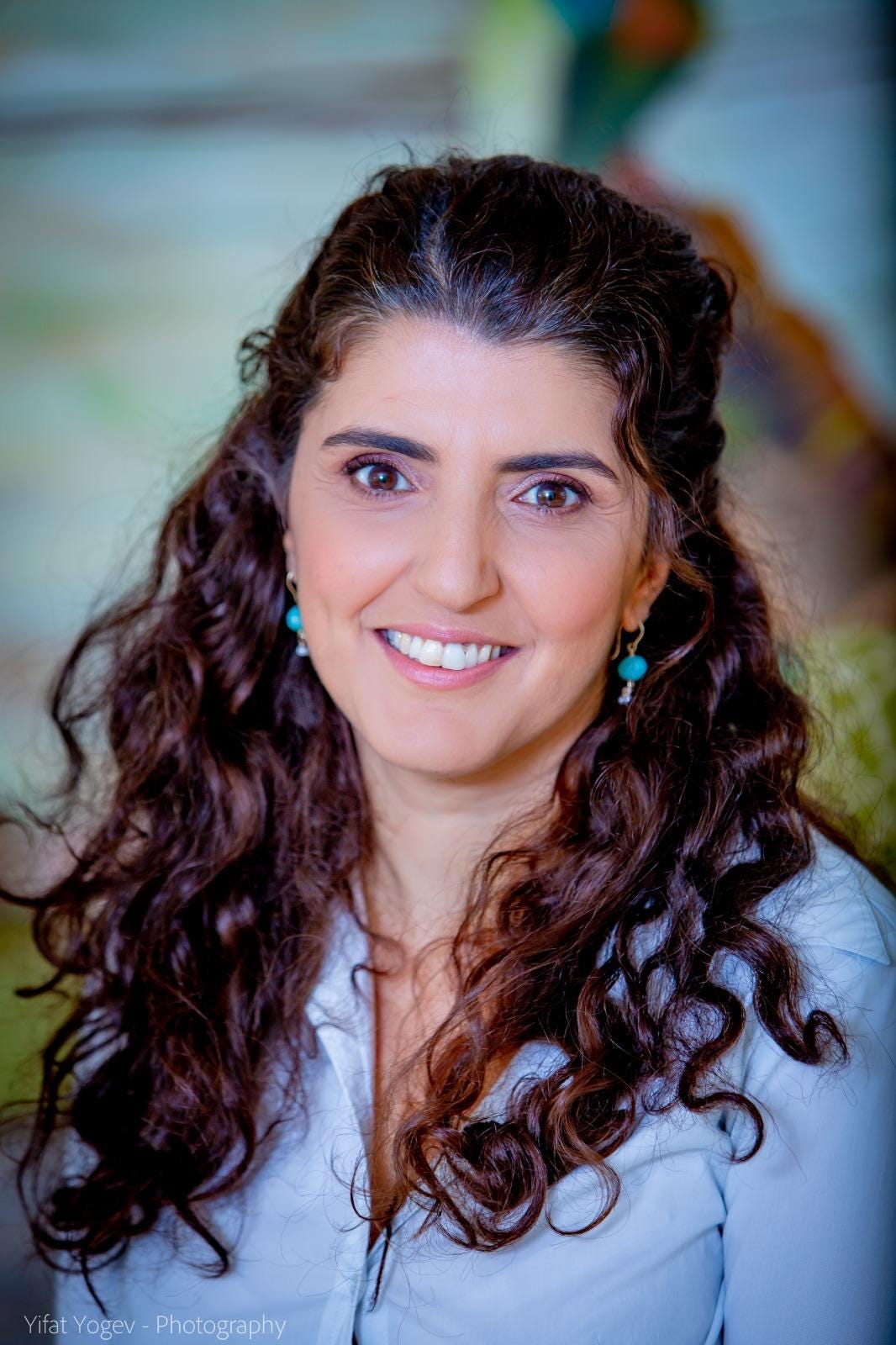

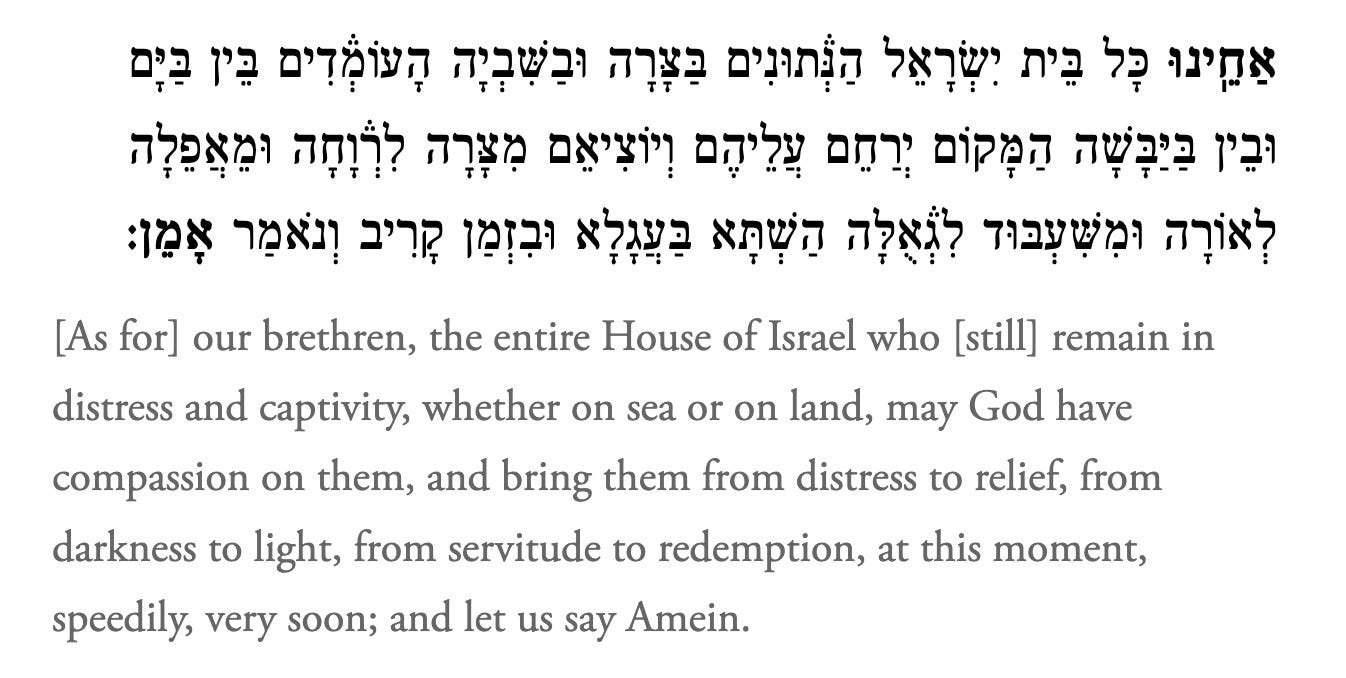
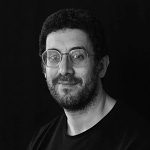
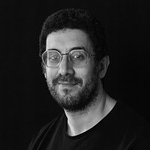
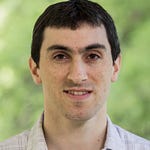
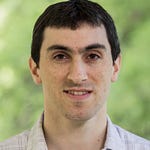
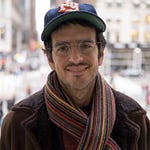
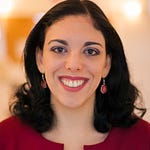

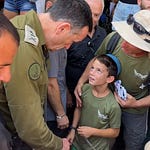
Healing Israel's souls: we share two very different sorts of projects